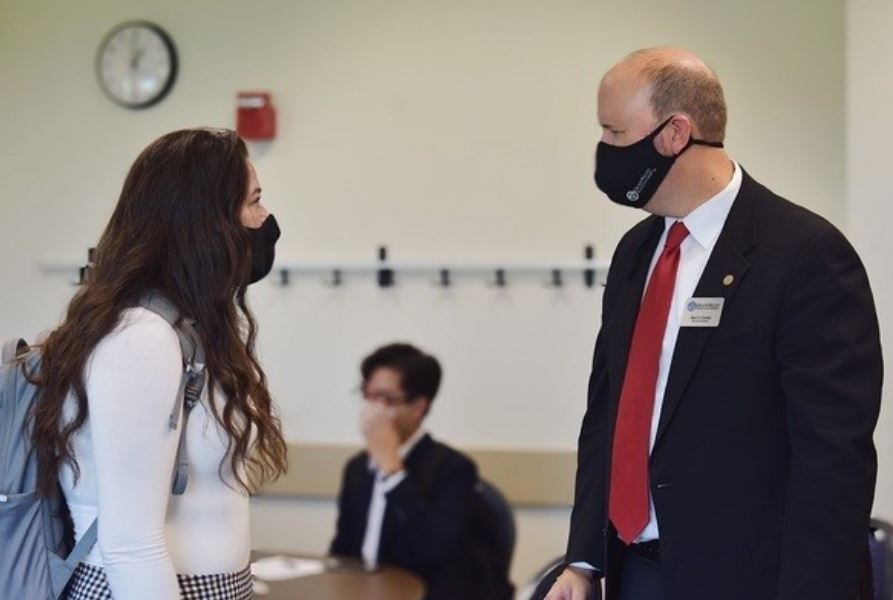Economics Club talks failure, disabilities, and reaching out for help
Courtesy / Seidman College of Business
Oct 11, 2021
Every other Friday at noon, Grand Valley State University’s Economics Club invites a speaker to give an hour-long talk for their virtual Lunch and Learn series. Open to all and intended to foster learning and interaction between students, faculty and community, these presentations explore open-ended topics relevant (but not limited) to the fields of economics and business. For the Lunch and Learn meeting for Oct. 8, GVSU alumni Erin O’Neil gave a webinar on how failure— when approached honestly— can spark growth.
“Why don’t we hear more often motivational speakers talking about their missteps or failures?” O’Neil asked. “It’s much more often that you hear them talk about positive characteristics, or that ‘if you work hard enough, you’ll get there.’ How can we talk more realistically about what success actually is, and what failure actually is? Failing forward should be normalized— it should be celebrated, because otherwise it’s going to create a toxic culture where failure is perceived as not allowed.”
O’Neil graduated from GVSU in 2016 with a Bachelor in Business Administration in Economics. Since then, she’s had three different jobs, currently working at Amway as a Forecast Analyst.
“For the longest time for me in school, fear and anxiety paralyzed me from realizing my actual potential,” O’Neil said. “It wasn’t until a few years ago that I realized constantly focusing on what other people think of me wasn’t helping me at all. I have ADHD, and I was not diagnosed until after college. I’m also dyslexic, which I knew before, but it’s something I’ve been able to focus on more now that i’m working at Amway.”
One 2010 study from the Pope Center for Higher Education reported that two out of every hundred undergraduate college students were diagnosed with Attention Deficit Disorder (ADD), Attention Deficit Hyperactivity Disorder (ADHD), or a learning disability like dyslexia. This proportion was double the number of diagnosed students from the decade prior.
“In school, I did not acknowledge that I was stressed, that I felt inadequate,” O’Neil said. “I wanted to look like the model student. I was not doing anything to take care of my different needs as a learner. I started as a B student, and I slipped down to a C student. I was so paralyzed by fear and stress that I couldn’t do anything. I wasn’t accepting my limitations.”
Many students with learning disorders can find themselves overwhelmed with navigating help in college. Fewer resources exist for students with disabilities at the college level in comparison to high school, where a diagnosis can automatically make a student eligible for an Individualized Education Plan. IEPs are provided by the federal Individuals with Disabilities Act, which only has authority over public K-12 education. In college, students must individually provide documentation to the disability services office, which then acts as a liaison between students and their professors.
“My stress got to the point where it was affecting both my mental and physical health, so I took a semester off,” O’Neil said. “When I came back, I started opening up more to professors, and I found so many wonderful mentors. Once I could be honest with both them and myself— and not feeling bad about myself— it helped me get back to Bs, and even some As. I know some people feel like they should always get As, but that wasn’t just an expectation for me: they were something I worked really hard for, and felt proud of.”
O’Neil emphasized that despite our culture’s belief that pushing yourself to work harder and longer is a marker of success, forcing yourself to endure stress without seeking help can be profoundly unhealthy.
“When I went to my professors, I was not looking for leniency, but asking for suggestions on how we could work better together,” O’Neil said. “I would ask things like, hey, I have dyslexia, could I please get your advice on how to write this essay? Just being open and honest and finding a strategy to help me succeed. Some professors won’t help you with that, but so many are. And when you’re open with people about your limitations, they realize that you’re human. They don’t just assume you’re slacking off whenever you trip up.”
Common accommodations between faculty and students with learning disabilities can include having access to the professor’s slides in advance of note-taking during a lecture, having permission to audiorecord classes for later review, or receiving course materials in different formats (like an audiobook instead of a textbook). Reaching out to arrange strategies for success can make all the difference— but students do have to reach out.
“They say ‘fake it till you make it,’ but projecting false confidence all the time can make you start to lose yourself,” O’Neil said. “People are always going to be asking you for more than what you can deliver, and especially more than what you can deliver perfectly. You’re going to fail some people. The more open and honest you are about your failures, the better you’ll be able to move on.”
Those interested in attending future Lunch and Learn sessions can find a full schedule on the Economics Club’s website and their Instagram. Upcoming presentations include Networking and Job Searching on Oct. 22, Interview Tips on Nov. 5, Diversity in the Workplace on Nov. 19, and Performance, Motivation, and Accountability on Dec. 3.























